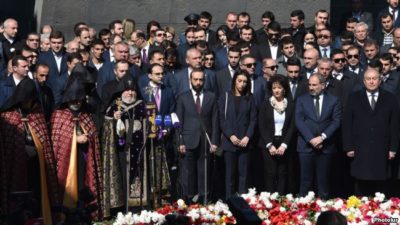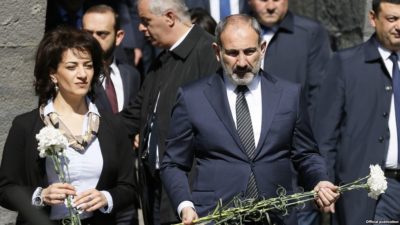YEREVAN — Tens of thousands of people marched to the Tsitsernakabert memorial in Yerevan and laid flowers there on Wednesday as Armenia marked the 104th anniversary of the 1915 genocide of Armenians in Ottoman Turkey.
As always, the annual procession began with a prayer service held by Catholicos Karekin II, the supreme head of the Armenian Apostolic Church, by the eternal fire of the hilltop memorial overlooking the city center. The ceremony was attended by President Armen Sarkissian, Prime Minister Nikol Pashinyan and other senior state officials.
“It is the day to recall once again the tragedy of our compatriots who had suffered ferocities and had been expelled from the land of their ancestors … to tell the world once again about the Genocide — the most hideous crime against humanity — and to call for soberness and a fight against denial,” Sarkissian said in a written statement issued on the occasion.
“Impunity that followed the Armenian Genocide had opened the doors for other grave crimes against humanity and genocides: remember the Holocaust, the tragedies in Cambodia and Rwanda,” he said.
A separate statement released by Pashinyan noted not only the slaughter of some 1.5 million Armenians but also the destruction of Armenian cultural heritage in the Ottoman Empire.
“We were consistently deprived of the land on which Armenian culture and Armenian identity were formed and developed over thousands of years,” read the statement. “The cultural heritage that constitutes the Armenian identity — thousands of schools, churches and monasteries — was erased from the face of the earth.”










